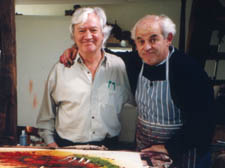|
|
 |
| |

Adrian Mitchell, left, with Ralph Steadman. |
That Mitchell and Steadman look
Artist Ralph Steadman shares his memories of Adrian Mitchell, the late ‘Shadow Poet Laureate’, from the famous Trafalgar Square recital of Tell Me Lies through to their final collaboration last year. By Dan Carrier
Tell Me Lies: Poems 2005 to 2008. By Adrian Mitchell, illustrated by Ralph Steadman.
ARTIST Ralph Steadman, like so many others, can remember exactly the first time the name Adrian Mitchell burned a special place in his mind. It was 1964.
Mitchell had stood at the base of Nelson’s Column in Trafalgar Square at one of the first big demonstrations against America’s involvement in Vietnam and delivered a poem he had written that articulated the mood of an entire generation.
“I remember the feeling of the crowd when he read his poem Tell Me Lies,” recalls Ralph.
“Immediately we knew Adrian was significant – and he also cut a good figure up there in front of all those people, sharing with them the words he had written.
“He was full of verve and conviction and hatred that day – not bad hatred, but hating the badness that was within the human race and really believing things could change for the better.”
The poet, who lived in Dartmouth Park, passed away at Christmas, aged 76. He and Ralph had recently finished work on his last book. Called Tell Me Lies, it covers work since 2005 and Ralph provided the illustrations to go alongside Adrian’s soaring lyricism.
Ralph recalls how they met: he had admired Adrian from afar until the poet contacted him in the 1990s, wondering if he might like to see a manuscript of poems he had put together.
“He sent me a manuscript called Who Killed Dylan Thomas?,” says Ralph. “He sent me this rough copy and I went through it, page to page, drawing pictures of things like Thomas lying on the floor and waggling about.
“I sent the book back to Adrian, having drawn all over it as a joke. He thought it was marvellous – that was the kind of relationship we had.”
Working with Adrian provided Ralph – known for his work with Gonzo journalist Hunter S Thompson and rock group Pink Floyd – was a unique challenge.
“My pictures had to integrate with his words,” he recalls.
“I had to lift them off the page. It had to become part of the poetry – not detract, but animate, them. It has to be said, his work is very animated already. We went well together – there are some things I have produced that are so esoteric they’d only fit with a Adrian Mitchell poem. Adrian would often remark: ‘People say poetry should not have illustrations, but I like to have Ralph doing them’.”
Ralph believes Adrian’s wish to have pictures with his writing shows how he approached his work.
“Artists always take second place to writers, and cartoonists are right down the food chain,” he says.
“Adrian did not see it like that. He appreciated cartoonists and he loved the idea of performing together and that we are all important.”
This, Ralph believes, comes from the vocal nature of Adrian’s poetry – the fact they are designed to be read aloud, not simply sit on a page for us to enjoy on our own.
“Performance poetry was always the most important thing to him,” says Ralph.
“Hearing him read out what he had written – it was the way he saw his work. He was into performance art and that was more important to him than the written word.”
He can still hear Adrian’s voice, six months after his close friend passed away.
“Little bits of his
poetry, with his voice reading it, come to me when I am thinking about other things,” he says.
“That is a real comfort – to be able to hear him and his work.”
According to Ralph, one of the things that made Adrian stand apart from other public orators was his voice.
“He was such a great public speaker and he had this lisp,” recalls Ralph.
“It was an attractive part of his delivery – a political poet, lisping away. The reason he did it was to say: ‘I am not a perfect man – none of us are. You can all hear me lisp – this is how I am, take me as I am.’
“It was the music behind the music, if you like, and made a powerful statement.”
The collection from the late “Shadow Poet Laureate” (as he was dubbed by the socialist magazine Red Pepper in 2002) is full of his quick wit. Adrian’s works have his own stamp of humour throughout – Ralph finds it hardly surprising he was a popular children’s author as he was tackling such topics as war.
His poetical roots go back to the style of William Blake, as well as being influenced by his love of jazz and blues.
His political pieces quickly became standards for the British Left – Adrian articulated the progressive thoughts of a political generation. This is another aspect of his friend’s character that Ralph greatly misses.
“He was so committed – I marvelled at his ability to always go on marches. He wanted to turn all of his enemies into his friends. He had no acid in him – it was pure love. He was an incredible, generous man, and was such an idealist. I used to think he was too good for this world. He trusted in progress so hopelessly. It was a product of the basic goodness within him.”
|
 |
|
 |
 |
|
 |
|


